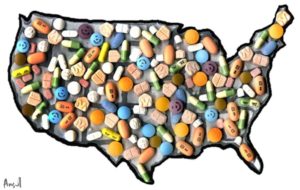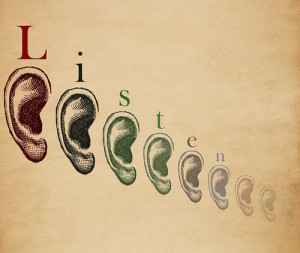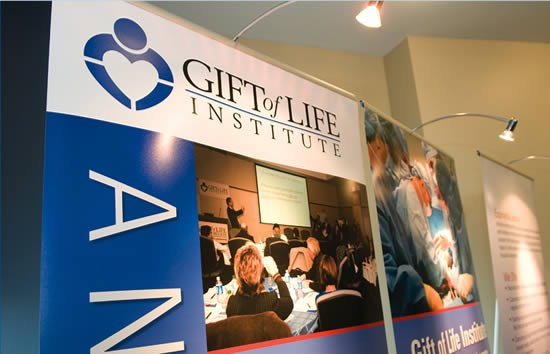If I’m in an accident and the hospital knows that I am designated as a donor, the doctors won’t try to save my life.
Truth: Doctors, nurses and paramedics will do everything they can to save your life. In fact, an individual must be in a hospital, on a ventilator and pronounced brain dead in order to donate organs. Organ Procurement Organizations (OPOs) are not notified until life-saving efforts have failed. The transplant team is not notified by OPOs until permission has been given by the deceased’s family.
If I am a registered donor, doctors may remove my organs before I have passed away.
Truth: Brain death (when the brain dies due to lack of blood and oxygen) is a medically, legally, and morally accepted determination of death. To determine brain death, more than one diagnosis of brain death and a series of tests over a period of time are required before the donor’s family is presented with the opportunity to donate.
Organs can be bought or sold on the black market.
Truth: These stories are untrue and have become harmful urban legends. Due to the complexity of transplantation, the necessity of involvement from highly trained medical professionals, the process of matching donors with recipients, the need for modern medical facilities and the support necessary for transplantation make it impossible for this to actually happen. The buying and selling of organs and tissues is illegal, as part of the National Organ Transplant Act.
I am too old to be a donor.
Truth: There is no set age limit for organ and tissue donation. At the time of death, trained medical professionals will evaluate patients on a case-by-case basis to determine which organs and tissues are suitable for donation. Therefore, people of any age who want to become organ and tissue donors should indicate it on their driver’s license and inform their family of their decision.
I have a history of medical illness. No one could benefit from my donation.
Truth: A person’s suitability for organ or tissue donation is always determined at the time of death. Clinical professionals from the organ and tissue donor program will review medical and social histories with the donor’s family at the time of death, on a case-by-case basis to determine if the donor is medically suitable.
Even if I say I want to only donate my corneas, they will take all of my organs.
Truth: You can specify which organ and tissues you want to donate in your will or by telling your family which specific gifts you would like to donate at the time of your death. Your decision will be followed.
I don’t need to tell my family that I’d like to be a donor because it’s already in my will.
Truth: By the time your will is read, it will be too late for you to be a donor. Telling your family now that you want to be an organ and tissue donor is the best way to make certain your decision is honored.
My family will have to pay if I become a donor.
Truth: Costs related to donation are no responsibility to you or your family.
My religion does not support organ or tissue donation
Truth: All of the major religions in this country approve of organ and tissue donation and consider it a gift – an act of charity. If you have questions, contact your religious advisor.
Organ and tissue donation means my body will be disfigured. My family will not be able to have an open casket funeral if I become a donor.
Truth: Donated organs are removed surgically, in a routine operation similar to other types of surgery. Doctors maintain the utmost dignity and respect for the donor at all times, so much so that donation will not interfere with traditional funeral arrangements such as an open casket.
Rich and famous people get moved to the top of the waiting list while “regular” people have to wait longer for a transplant.
Truth: The organ allocation and distribution system is blind to wealth or social status. The length of time it takes to receive a transplant is governed by many factors including blood type, length of time on the waiting list, severity of illness and other medical criteria. Factors such as race, gender, age, income or celebrity status are never considered when determining who receives an organ.
The recipient will know who I am.
Truth: Information about the donor is released to the recipient only if the family of the donor requests or agrees to it. Otherwise, the strictest confidence of patient privacy is maintained for both donor families and recipients.
Patricia Mulvania has more than 30 years’ experience in the healthcare field, beginning her career by providing emergency patient care in the pre-hospital setting. Since, Patti has served in leadership roles in the emergency department, homecare, and hospice arenas. She has extensive teaching and leadership experience in both OPO and healthcare fields, and has personally conducted and supervised OPO clinical activity, from initial donor referral through completion of organ recovery. Training professionals to compassionately and proficiently lead conversations with potential donor families that result in proactive, informed, and enduring donation decisions is her specialty.
Strong and effective communication skills are essential in a field where emotions often reach critical mass. Professionals must be equipped to help families process complex information intertwined with decision-making that can have a lifetime impact on both the potential donor family and those they have the ability to help through donation. Teamwork is imperative for everyone involved.
Surprisingly, one key aspect of communication is often overlooked or underrated by professionals in this field… the power and impact of listening
When asked, most professionals will say that they are good active listeners. It’s surprising to realize how rarely people actually do attentively listen to one another when interacting. We allow ourselves to be distracted, preoccupied by other matters of importance, or thinking about what we’re going to say next. In fact, one of the most difficult communication skills to learn is to give someone the respect and consideration they deserve by being “fully present”… and giving others our full attention.
Listening has been shown to be essential to communicating respect for another person. To test this claim, reflect on your own feelings. Consider a time when you may have been talking with someone who interrupted you or continually focused on what they wanted to express in the conversation. Maybe it was clear that their mind was elsewhere and they weren’t at all “fully present” with you. When we want to build a strong relationship with another person, our ability and commitment to listening attentively and empathically is essential.
Not all listening is the same
Passive listening is little more than hearing. Passive listening is listening without reacting: allowing someone to speak, without interrupting. Not doing anything else at the same time, and yet not really paying attention to what’s being said. Passive listening is one-way communication where the receiver doesn’t provide feedback or ask questions and may or may not understand the sender’s message.
Active listening includes responses that demonstrate that you understand what the other person is trying to tell you about his or her experience. This is a communication technique that’s very different from the passive or unfocused listening that we often adopt in everyday conversation.
When you accurately reflect back to a person what’s been said, you show that you’ve been listening—not just hearing—and that you genuinely understand the feeling/s or message/s they are trying to convey. This creates an environment that allows the speaker to go deeper, and sometimes even to come to new realizations. It’s the basis for trust and respect. It’s also the foundation you need to better serve both donor and recipient families.
Active listening is a conscious effort that demands empathy, effort, attention, and lots of practice
When faced with speaking to bereaved families, healthcare professionals often express the fear of “saying the wrong thing.” This may reflect anxiety about triggering intense emotions. Another concern is that we might feel inadequate in our ability to offer comfort and support. And this is certainly understandable. In reality, no words alone can relieve the family’s loss and pain. What is important to remember is that by implementing active listening tools and techniques, you’ll be able to provide an environment where families can safely talk about their experiences and begin to come to terms with this life-changing event. Being listened to increases people’s ability to rally their own coping skills and, at the same time, provides comfort and healing in times of greatest need. Your knowledge and skills may make all the difference to many families.
Becoming an effective communicator is a dynamic process and lifetime pursuit. There is much, much more to active listening and to the many other skills that will help you provide excellent care to potential donor families and to communicate effectively with your team members.
Active listening builds strong relationships and, while it may not come naturally to many of us, it’s an invaluable communication skill. Becoming an excellent listener will take determination and practice and it will be well worth it in both your professional and personal life.
Patricia Mulvania has more than 30 years’ experience in the healthcare field, beginning her career by providing emergency patient care in the pre-hospital setting. Since, Patricia has served in leadership roles in the emergency department, home-care, and hospice arenas.
Drug and opioid overdose deaths are on the rise across the country, increasing by approximately 140% since 2000. Significantly contributing to this increase is the usage of natural and semisynthetic opioid pain relievers, heroin, and non-methadone synthetic opioids. 2013 to 2014 saw increases of overdose deaths related to those specified opioids as 9%, 26%, and 80%, respectively. Recommendations to reverse this upward trend of opioid related deaths are: improving safer prescribing methods of prescription opioids; expanding access to and use of antidotes (such as naloxone) and increasing access to medication-assisted treatment combined with behavioral therapies; and collaboration amongst public health agencies, ME/Coroners, and law enforcement agencies to improve detection and responses to identified drug overdose outbreaks.
While public health agencies struggle to identify measures to curb this rapidly increasing and often fatal trend, donation professionals find themselves more and more frequently faced with overdose victims who have become potential organ donors. Families of these victims are emotionally depleted by often years long battles to help their loved ones overcome their addiction, only to find that the battle has culminated in their worst nightmare. All has been lost. There will be no more trips to rehab or late night calls for help. The more we can gain insight into what families have experienced, the better able we become to offer the resources and support each unique family may need. Consider having a parent or spouse of someone who has suffered from drug addiction and died, come in and speak with your staff. Their stories are powerful, and the opportunity for staff to ask questions and learn more about what considerations they should keep in mind when caring for these families are significant. When talking with health care providers who feel drug addiction and overdoses render individuals incapable of offering the gift of life through donation, be sure staff have solid talking points that can help them convey the positive outcomes that can be achieved through donation. Start a conversation among your own staff to be sure everyone has the information they need to communicate effectively in these situations with families and care providers. If you are doing something at your OPO related to the increase in potential donors regarding opioid overdose that could help other professional be more effective in this area, please share; we’d love to have you participate in our blog.
For more information on this growing epidemic, click here.
Patricia Mulvania has more than 30 years’ experience in the healthcare field, beginning her career by providing emergency patient care in the pre-hospital setting. Since, Patricia has served in leadership roles in the emergency department, home-care, and hospice arenas.



